September 18, 2025- Visit to Battambang Campus of Sihanouk Raja Buddhist University, Cambodia
Hello. Today, Sunim left Mandalay, Myanmar and traveled to Battambang, Cambodia, where he had a conversation with female students at the dormitory of Sihanouk Raja Buddhist University.
Sunim left the accommodation at 5:30 AM and departed for Mandalay Airport. After arriving at the airport, he said farewell to Venerable Kittisara and boarded a flight to Bangkok.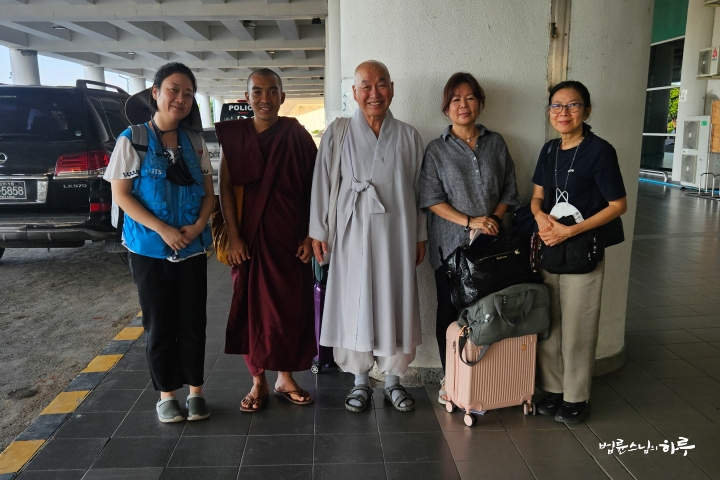
At 8:10 AM, he left Myanmar by plane and arrived at Bangkok’s Suvarnabhumi Airport at 10:30 AM. In Bangkok, he said goodbye to Ancheli and agreed to meet again when visiting the Nan region of Thailand. Kim Seon-young was waiting at the airport to greet him. 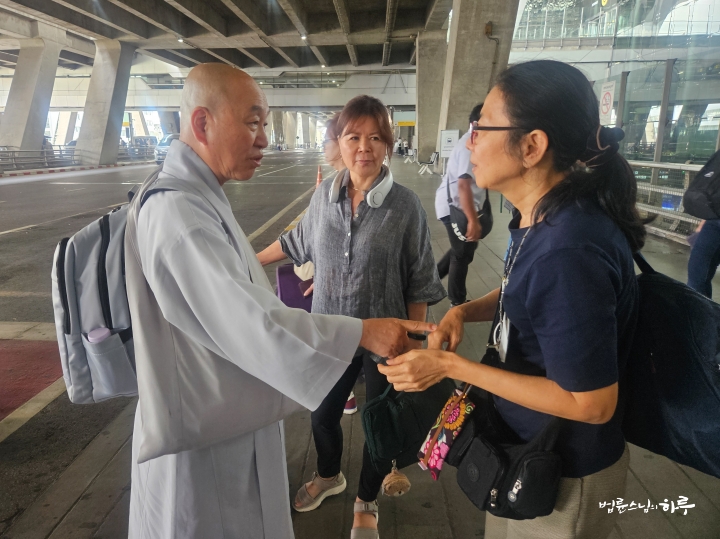
Due to the tight schedule, they went directly from Suvarnabhumi Airport to Don Mueang Airport.. In the car to Don Mueang Airport, they had lunch with a they had packed lunches prepared by Kim Seon-young. Jungto practitioners were everywhere, supporting Sunim’s activities from behind the scenes.
They arrived at Don Mueang Airport at noon, completed departure procedures, and took a 1:30 PM flight to Siem Reap Airport in Cambodia. When they arrived at Siem Reap Airport at 2:30 PM, monks and female students from Battambang Campus of Sihanouk Raja Buddhist University, including Vice President Ven. Pok Pan, were there to greet them.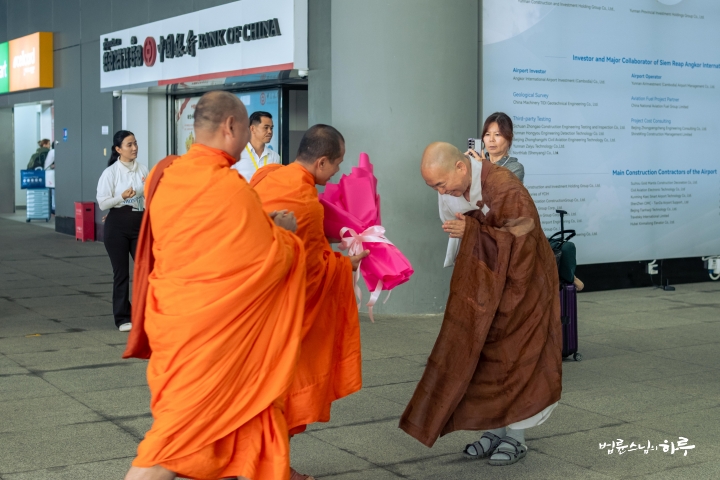
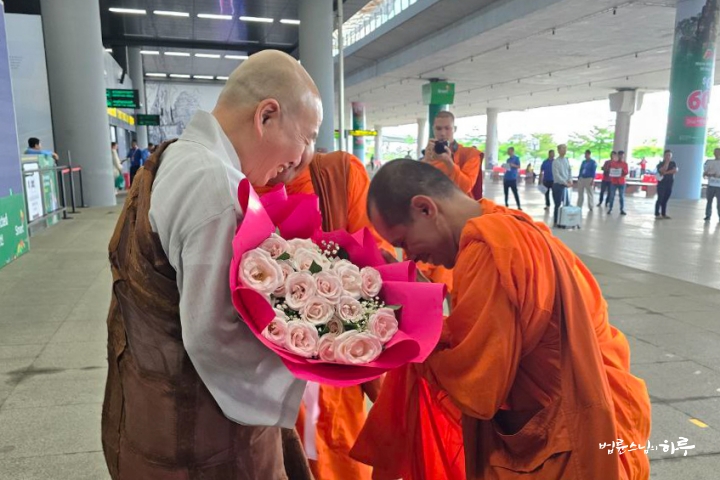
After exchanging warm greetings, they traveled 170 km by car to Battambang. Due to poor road conditions, it took over 4 hours.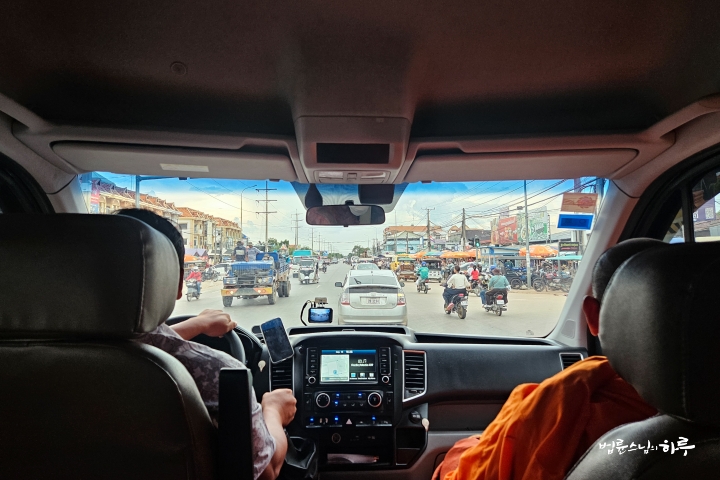
On the way, the Vice President explained about the border dispute between Cambodia and Thailand. He said this area has experienced repeated territorial disputes with Thailand, and the suffering of residents continues to this day. Ancheli, who holds Thai nationality and had planned to join this schedule, was unable to do so due to the aftermath of the dispute. During the journey, they had many conversations with the Cambodian monks in the car.
At 7 PM, they arrived at the female student dormitory of Battambang Campus of Sihanouk Raja Buddhist University. President Ven. Sovichea and the students warmly welcomed them. This dormitory was completed last year by JTS for female students from rural areas at this university.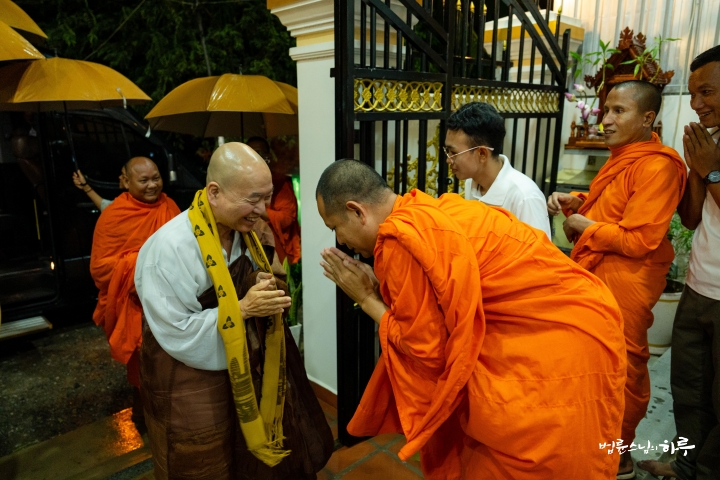
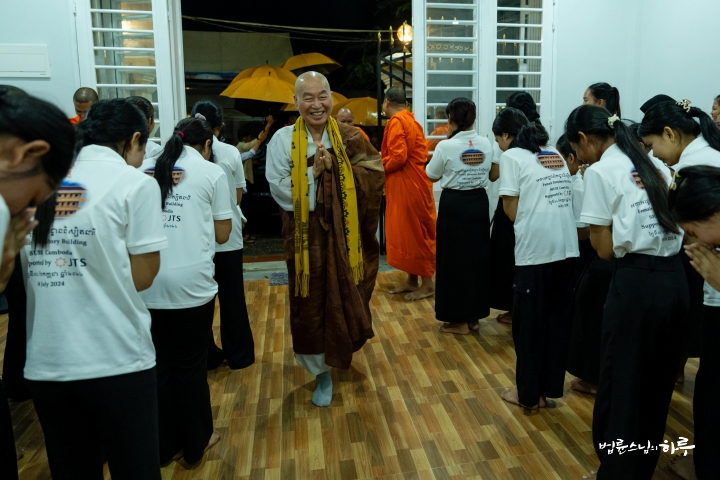
First, they had a meeting with the female dormitory students. It was especially nice to see the students again, whom they had met once during the dormitory completion ceremony last year. The students welcomed Sunim’s visit and expressed their gratitude to him. Next, they requested a Dharma talk from Sunim.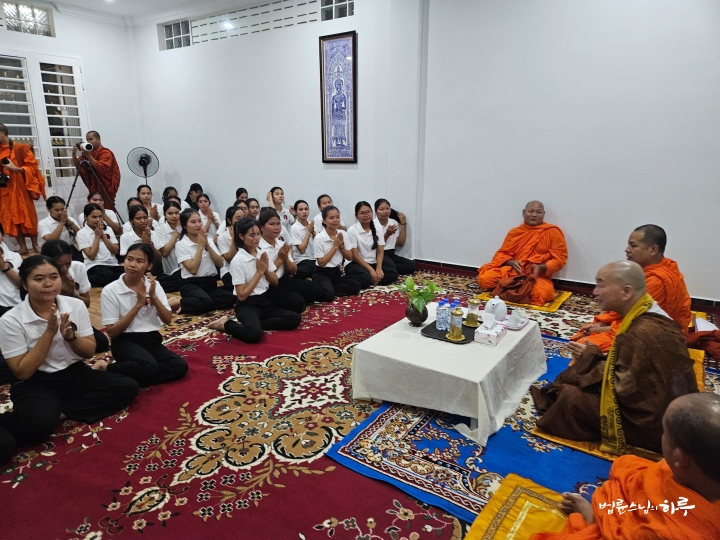
Sunim began his greeting by first asking the students how they were doing.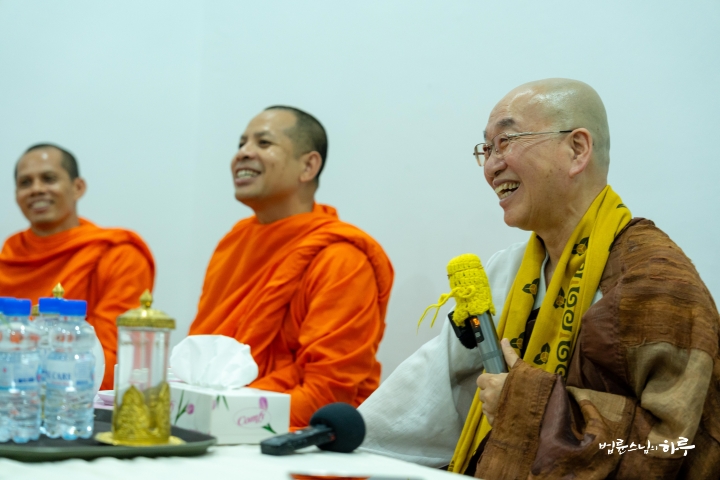
“Namo Buddha, Namo Dharma, Namo Sangha. Everyone, it’s nice to meet you. I thank President Ven. Sovichea and all the monks for welcoming me like this. This time, due to time constraints, I’m only able to visit briefly. The first reason I came is to see how you are living. The second reason is to check whether it’s worth building the dormitory extension that Ven. Sovichea wants, if this place is being well managed. The third reason is to conduct a field survey because there was a request for establishing a high school in a nearby rural village. Since it’s a short schedule and we don’t have enough time for separate conversations, we’ve gathered like this in the evening to at least see your faces. Are you all living well?”
The students answered loudly.
“Yes, we’re doing well.”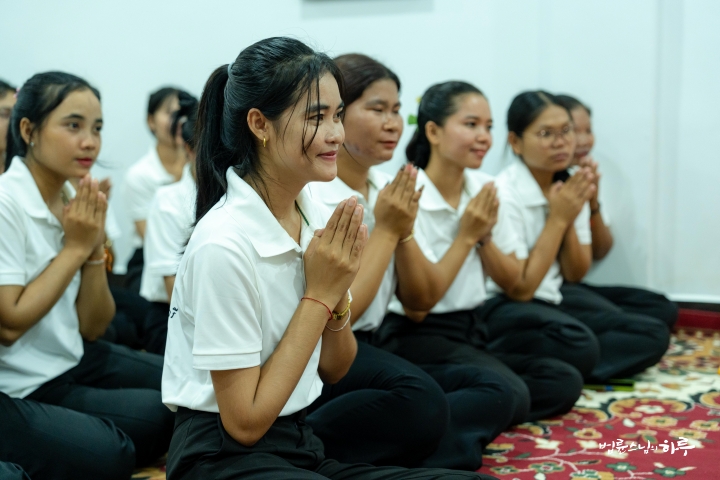
“Don’t you fight with each other while living in the dormitory? Are there any conflicts because you push meal preparation or cleaning duties onto each other? Even families living together have such conflicts. Do you keep your living space clean? Or do you live in a messy environment?”
“We live cleanly.”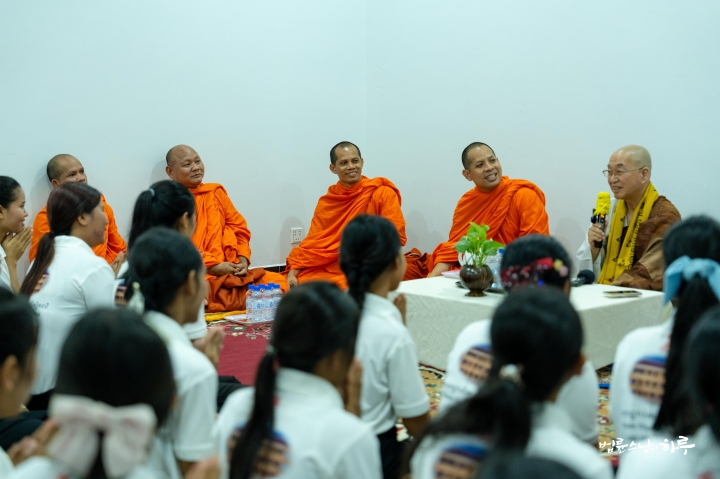
“You did some major cleaning for my visit today, didn’t you?””
“Not just today, but we always live cleanly.”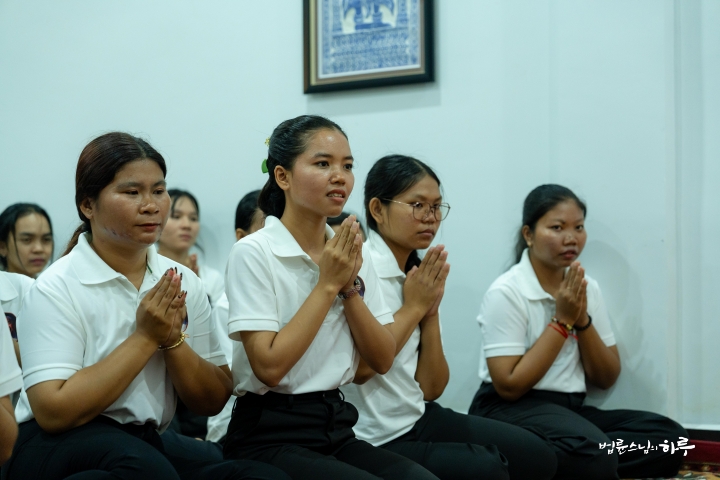
“When the President said that a female student dormitory was needed, I could fully empathize because I also grew up in the countryside and had the experience of living alone while attending school in the city. Before entering the temple, I lived alone for 4 years from 7th grade to 10th grade, cooking my own meals while attending school. Then at the end of 10th grade, I entered a temple next to the school and became a monk. Since you’re living here, how about shaving your heads and becoming bhikkhunis? I became a monk at a much younger age than you. (laughter)
Your Living Attitude Is More Important Than the Building
I told Ven. Sovichea, ‘Building structures is important, but how students live is very important.’ I once built a dormitory for male students in Mindanao, Philippines, but the students’ life management wasn’t properly handled. There were many problems in their daily life, such as not cleaning and meal duty students not preparing meals on time. When Ven. Sovichea heard this, he said not to worry because Cambodian female students would live well. When Ven. Sovichea came to Korea last June, I asked if the dormitory was being operated well, and he said ‘It’s being operated well’ and wanted to build another dormitory. So I said I would decide after seeing the dormitory operation situation myself. Is the dormitory being operated well?” (laughter)
“Yes.”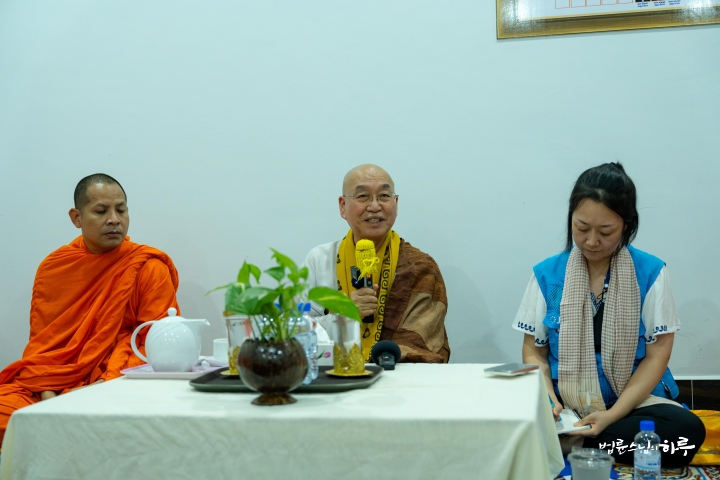
The Way to Escape Poverty Is to Study and Become Self-Reliant
“I heard that you were born and raised in rural areas and your family circumstances are difficult. The way to escape poverty is through education and self-reliance. I hope this dormitory helps you in your living and learning. And if you have received such benefits, you must repay the kindness. The way to repay the kindness is to grow up and become someone who can help your juniors or others even a little. I hope you become people who know gratitude and repay kindness.
I heard that Ven. Sovichea here also grew up in difficult circumstances. I was deeply moved to hear that he is dedicating himself to helping those in need, especially to solving educational problems. Please say ‘Thank you’ to Ven. Sovichea and the monks here.”
“Thank you.”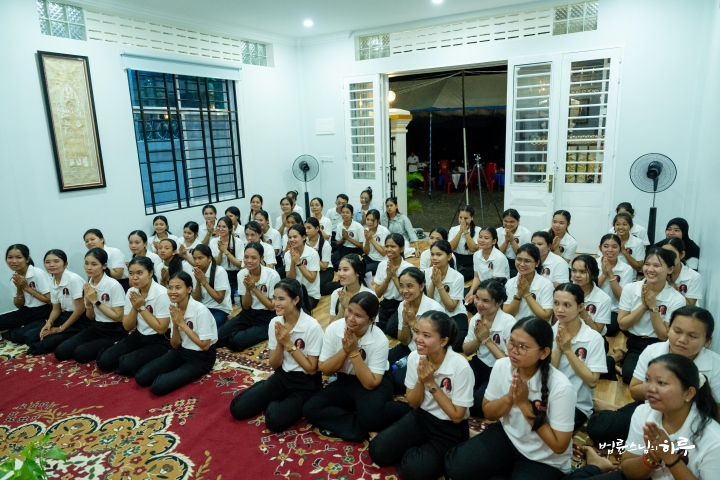
“If you have any difficulties, inconveniences, or things to improve while living here, please feel free to talk about them.”
The students hesitated at first but soon opened their hearts and began to speak. Rather than difficulties, they expressed their gratitude.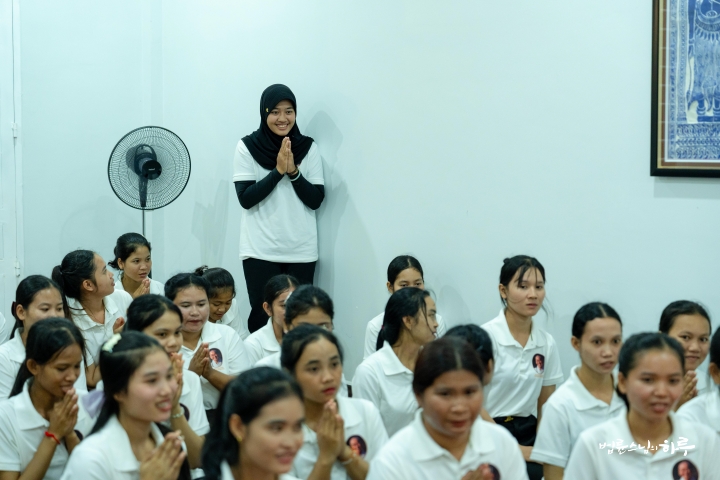
“My mother is responsible for our family alone, so it was very difficult economically. It’s really helpful that I can live here for free.”
“There were almost no opportunities for education in the countryside, but I’m so grateful that I can study while living here.”
“I’m happy that I can lighten my parents’ burden even a little.”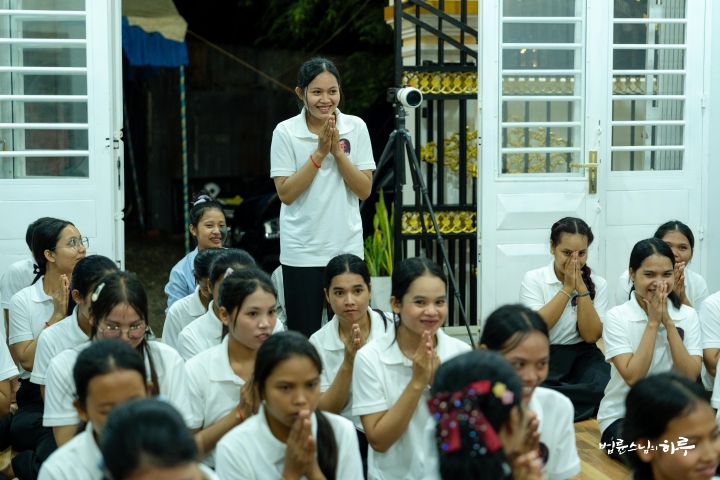
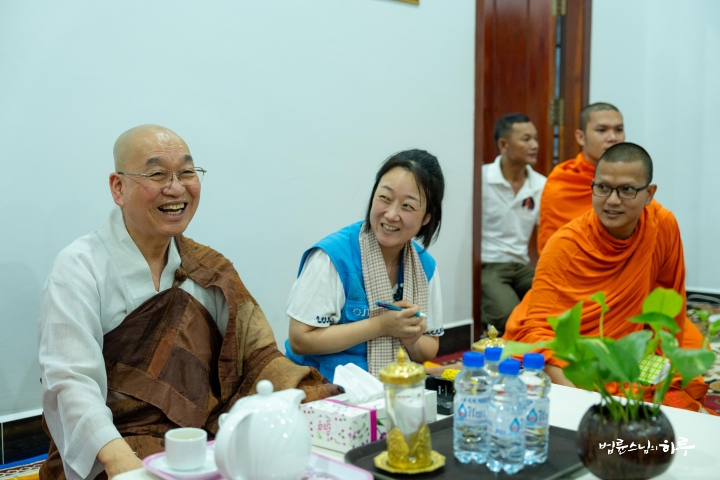
Before we knew it, it was 8:30 PM as we conversed. After finishing the meeting, Sunim toured the dormitory rooms directly.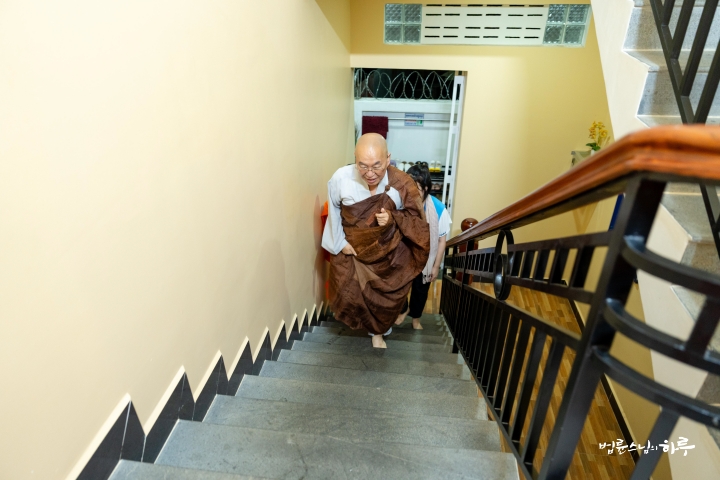
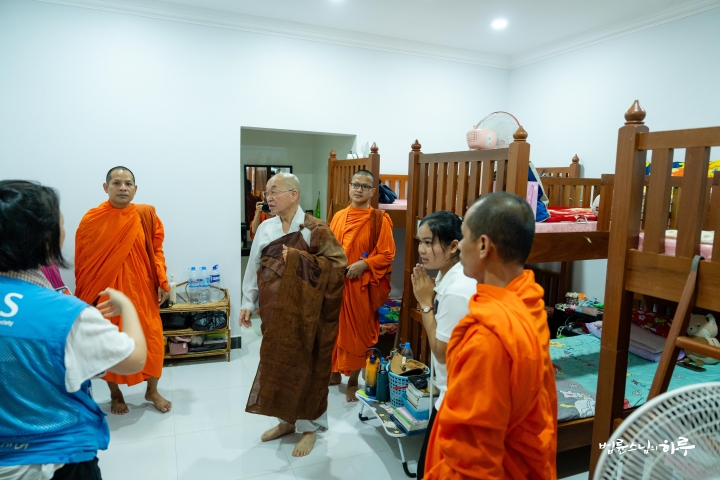
He examined the storage space, hygiene conditions, and room structure. Sunim also made various suggestions on how to use the space neatly.
“How about putting boxes under the beds to use the space more efficiently? If you reduce items as much as possible and organize considering your daily movement patterns, it will be much more comfortable. Jungto Society also has many members living in community life, and there are limits on personal belongings. We keep only what’s absolutely necessary and share the rest.” 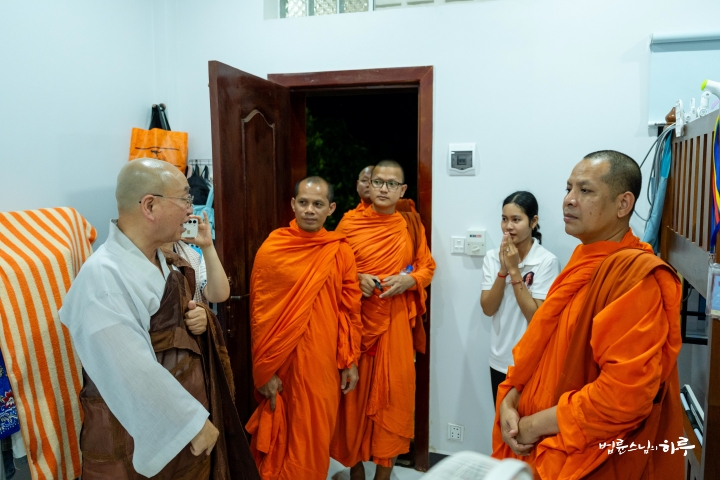
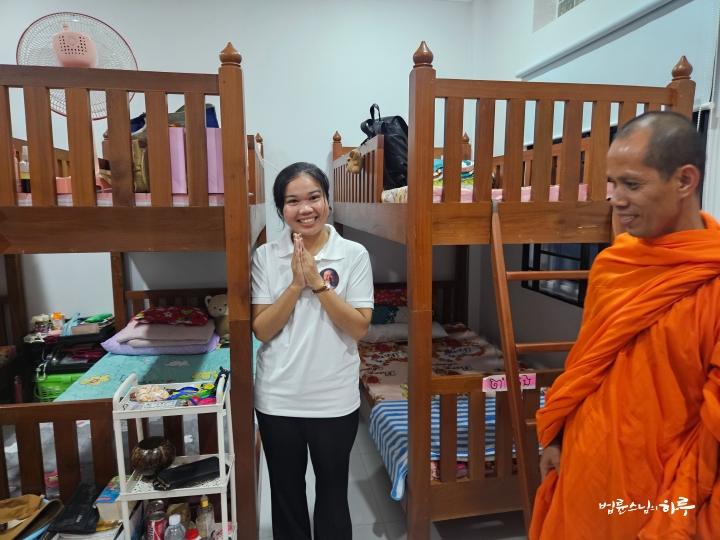
After touring the entire dormitory, Sunim gave the students food supplies needed for cooking.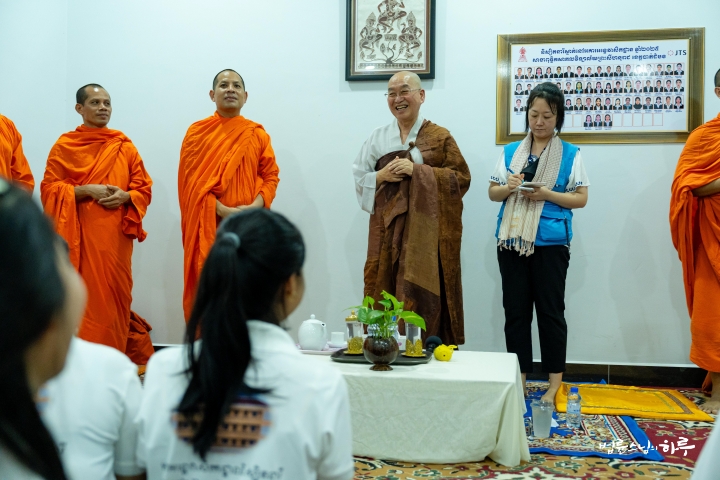
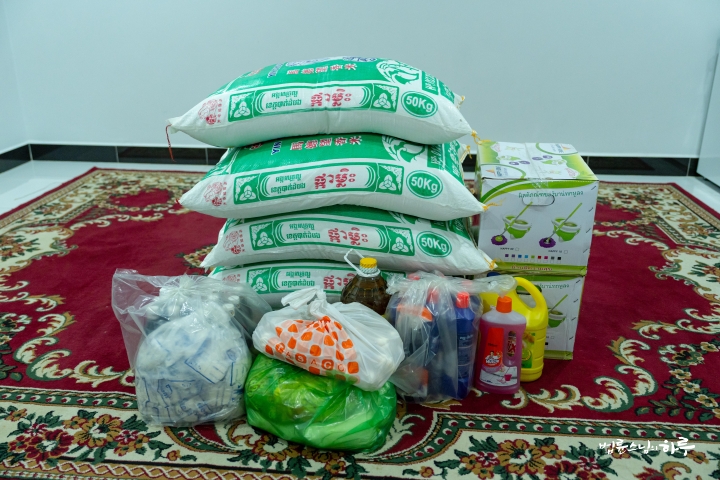
The Buddhist university students also presented Sunim with a handmade Korean flag and gifts.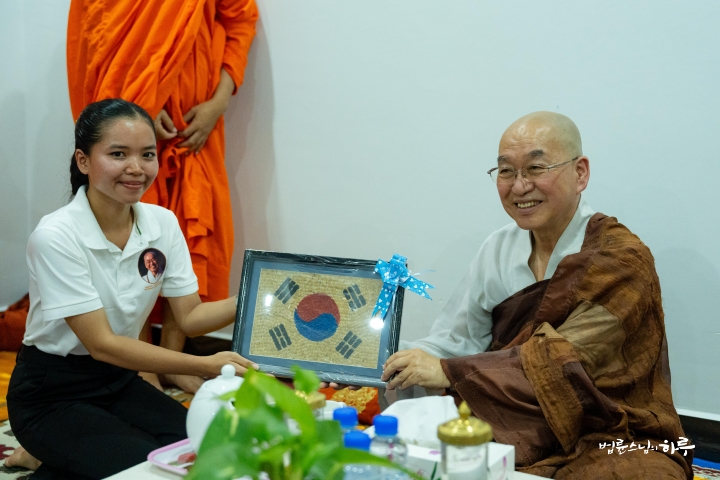
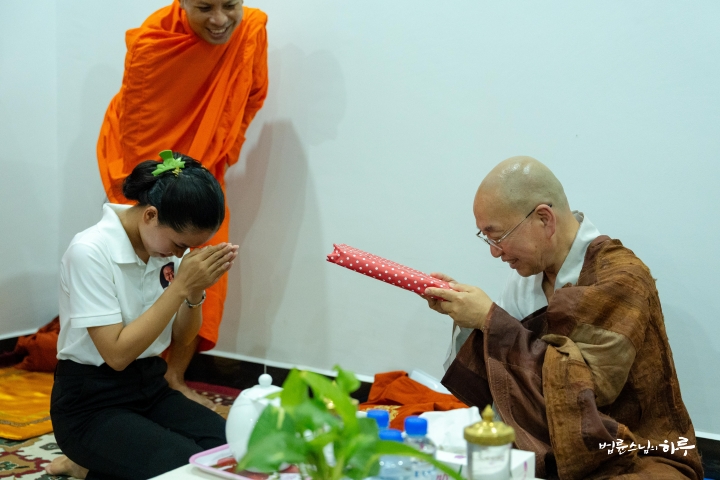
Finally, they took a commemorative photo with the students.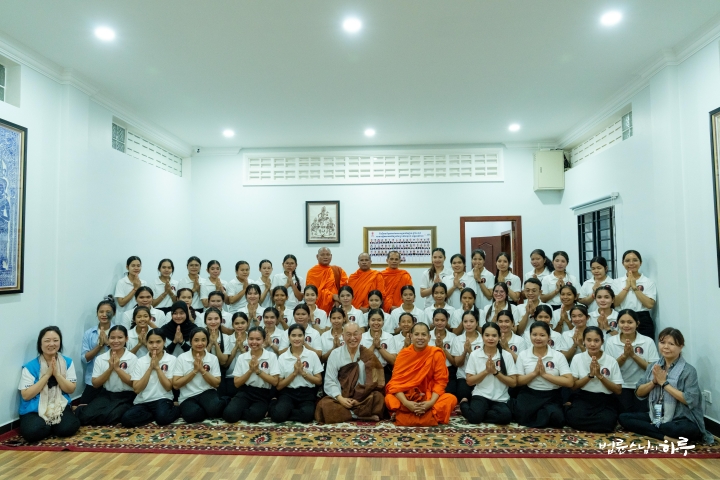
After saying goodbye to the students, they also toured the site for the second dormitory, located right in front of the dormitory.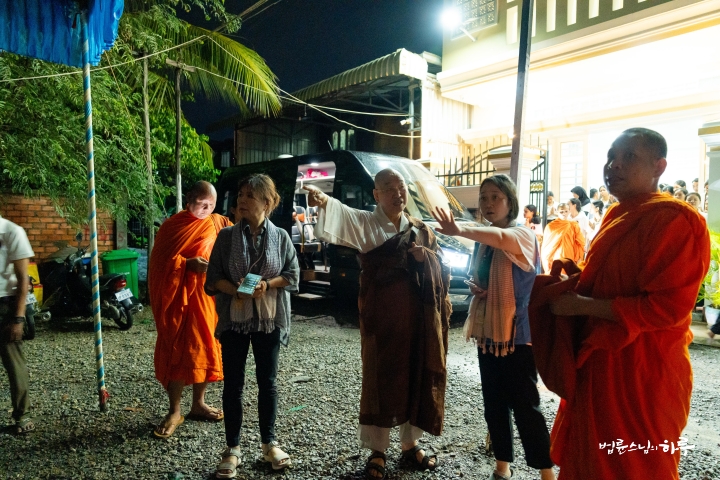
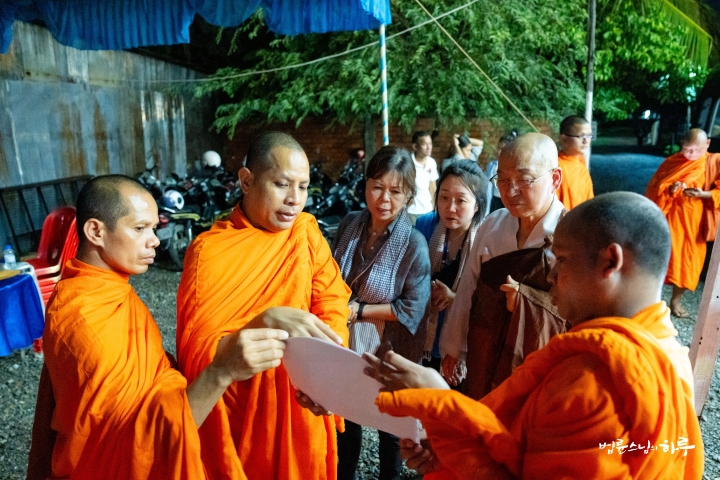
Next, they held a meeting with the President and Vice President about how to build the second dormitory.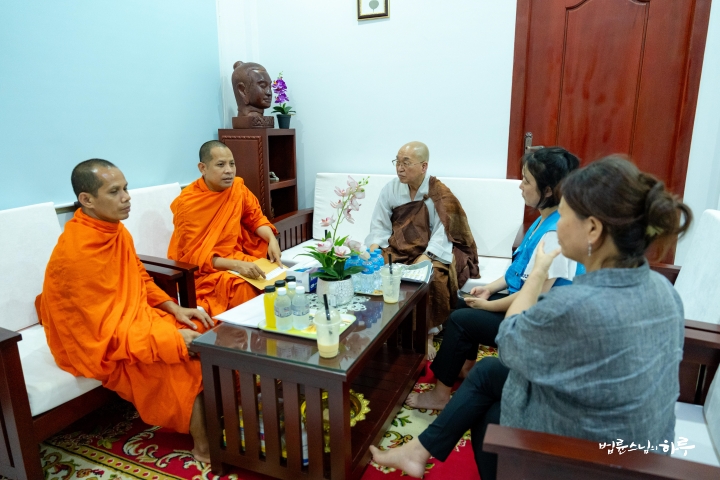
After the meeting, Sunim presented his books translated into English to the Buddhist university monks.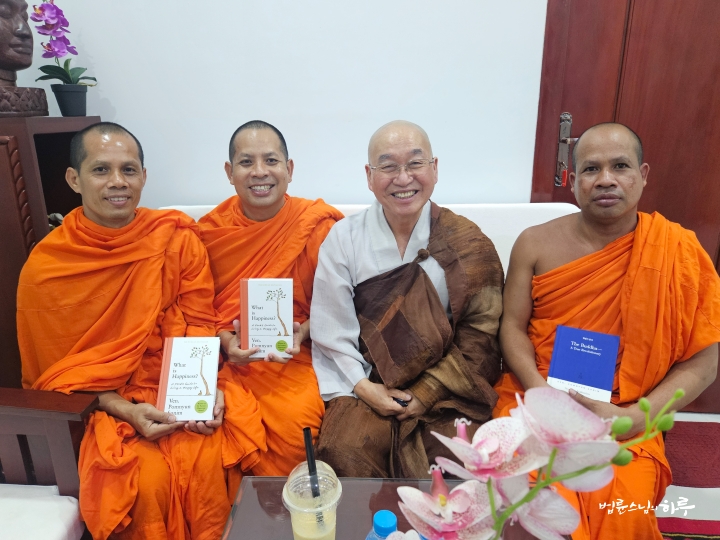
By the time all schedules were completed, it was already past 9 PM. Dinner was prepared for Sunim and his party from Korea. Although it was late, they ate together out of respect for those who had prepared the meal. The Cambodian monks didn’t eat as they observe the practice of not eating after noon, but they sat together and had conversations.
The day’s schedule ended at 10 PM. Tomorrow, they plan to tour the high school site and the project sites that the President is working on, hold meetings, and then move to Bangkok.
Since there was no Dharma talk today, I’ll conclude by introducing the conversation between a questioner and Sunim from yesterday’s Weekly Dharma Assembly.
How Should I Accept a Series of Misfortunes Including Voice Phishing, Traffic Accidents, and Falls?
“Several incidents and accidents happened all at once. In this case, we can say ‘incidents and accidents overlapped.’ Actually, even one incident or accident per year isn’t welcome, but four in one month is quite unusual. It seems like a situation where one might say ‘bad luck’ or ‘misfortune.’ However, incidents and accidents sometimes happen in clusters, and sometimes nothing happens for an entire year. When rolling dice, the probability of getting a 1 is one-sixth, but when you actually roll, it might come up exactly once in six rolls, all six times, or not at all. In other words, one-sixth.
However, incidents and accidents sometimes happen in clusters, and sometimes nothing happens for an entire year. When rolling dice, the probability of getting a 1 is one-sixth, but when you actually roll, it might come up exactly once in six rolls, all six times, or not at all. In other words, one-sixth is just a mathematical probability, and actual results can vary from never appearing to appearing all six times.
From a probability standpoint, such occurrences are very rare. Four incidents happening in succession within a month is as rare as rolling a 1 six times in a row with dice. However, it’s not impossible either.
In the past, people would call this ‘bad luck,’ or interpret it positively as ‘small accidents preventing big ones’ – a form of warding off misfortune. They would accept it positively, thinking ‘This prevented greater disasters, so it’s actually a good thing.’
Looking carefully at the four incidents you mentioned, they’re all things that could reasonably happen. In daily life, you could slip and fall down stairs, get into a traffic accident, catch the flu. Voice phishing is something anyone can fall victim to if they’re not careful.
If we must find a cause, all four are somewhat related to ‘lack of attention.’ Slipping on stairs, and while traffic accidents are often unavoidable, they tend to happen more when attention is lacking. So upon reflection, you might consider whether you were perhaps a bit scattered or inattentive. In Buddhist terms, this means lack of mindfulness, or in secular terms, you need to stay alert. I’d say about 20 percent was due to inattention, and the remaining 80 percent was simply overlapping coincidences.
But there’s no need to nurture anxious feelings. In the past, people carried amulets or performed rituals for psychological stability. If you’re really anxious, praying at a temple could be one approach. What’s important is gaining psychological comfort.
However, from a practice perspective, it’s good to use such incidents as an opportunity to resolve: ‘I should maintain better mindfulness and live with more attention.’ The rest can simply be regarded as mere incidents and accidents.”
“The moment I asked Sunim the question, my fear seemed to disappear. I realized ‘I was fooled by momentary emotions again,’ and I’ll live with attention and alertness.”
“But accidents happen even when you’re alert. Just yesterday at the airport, I suddenly couldn’t remember where my passport was. It wasn’t in my bag or pockets, and no matter how I searched, I couldn’t find it. I was worried it was serious, but eventually someone else found it for me.
And the evening before, when I opened my glasses case to put on my glasses, they weren’t there. I remembered taking them off, but had no memory after that. I thought ‘I must have left them somewhere,’ but someone with me said, ‘Sunim, you were wearing them during the site visit earlier.’ I had no memory of wearing glasses today. When I checked the photos taken then, I was indeed wearing glasses. I finally discovered them on the bathroom sink much later. I couldn’t have found them alone – someone else found them for me.
Such things can happen to anyone. It’s partly due to age, and in Buddhist terms, it’s inattention – losing mindfulness. When it’s hot and you’re living frantically, it happens even more.
So first, maintaining mindfulness is necessary, and second, they say that as we age, small blood vessels in the brain can become blocked, causing memory decline or temporary forgetfulness. Considering this, there’s no need for excessive worry.”
“Thank you. I understand well.”





